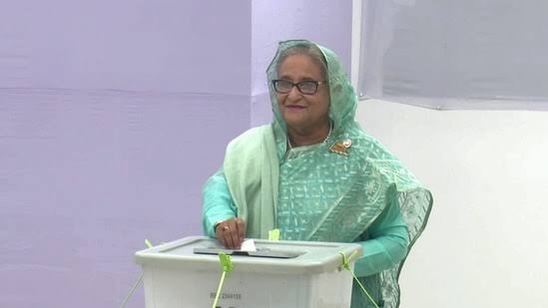Bangladesh’s Prime Minister Sheikh Hasina secures fifth term amidst opposition boycott

Bangladesh’s Prime Minister Sheikh Hasina appears poised for a fifth consecutive term in office, with partial results indicating a significant victory following a boycott led by an opposition party she labeled a “terrorist organization.”
Despite allegations of human rights abuses and a crackdown on the opposition, Hasina’s ruling Awami League and its allies reportedly secured at least 85 percent of the announced 114 seats.
The opposition Bangladesh Nationalist Party (BNP), weakened by mass arrests, declared a general strike and abstained from participating in what they termed a “sham election.” Hasina defended the democratic process, dismissing the BNP as a terrorist organization while urging citizens to express faith in the electoral system.
As per Bangladeshi media reports, Hasina’s Awami League won 93 out of the 114 seats declared, with its ally Jatiya Party securing four seats. Independent and other allied lawmakers claimed the remaining 17 seats. Notably, Bangladesh cricket team captain Shakib Al Hasan emerged victorious in his constituency.
Chief Election Commissioner Habibul Awal reported a preliminary turnout of around 40 percent. While some voters expressed enthusiasm for their favored candidates, others voiced apathy due to the perceived predetermined outcome.
BNP head Tarique Rahman, living in exile in Britain, criticized the election, raising concerns about “fake votes” influencing turnout. He described the process as a “disgrace” to Bangladesh’s democratic aspirations, sharing what he claimed were “disturbing pictures and videos” supporting his allegations.
Amidst the political landscape dominated by Hasina and the ailing two-time premier Khaleda Zia, concerns of a “further crackdown” persist. The government’s security forces have faced accusations of extrajudicial killings and enforced disappearances, allegations it rejects.
International scrutiny has intensified, with the United States imposing sanctions on a police unit and its top commanders. Economic challenges, including food cost spikes and chronic blackouts, have fueled dissatisfaction, especially in the garment sector, which accounts for a substantial portion of Bangladesh’s annual exports.
As political discontent simmers, analysts warn of a potentially “dangerous combination” as Hasina’s government, perceived as less popular than before, faces limited opposition at the ballot box.












